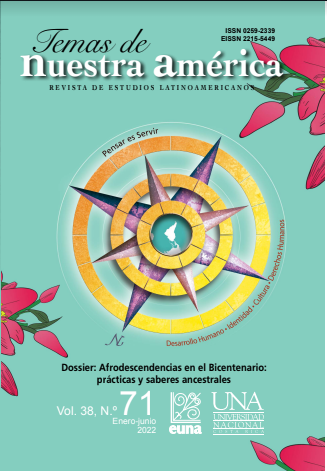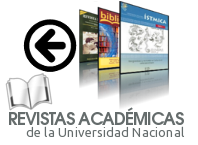Eulalia Bernard Little's lifetime and political legacy
DOI:
https://doi.org/10.15359/tdna.38-71.4Keywords:
African Diaspora, Afro-Costa Rican women, women in politics, black women, negritude, political thinkingAbstract
This article analyzes the role of Eulalia Bernard Little (1935-2021) as a pioneer in representing Afro-Costa Rican women in public and international decision-making and management arenas. Through the use of visual and documentary archives and by employing an interdisciplinary methodology that combines discourse analysis and ethnography, her pioneering status in the black political field, both inside and outside Costa Rica, is examined. First, her consolidation as a Diaspora activist during the 1970's is explored, from the relationship between her own experiences in Afro-Caribbean circulation and her participation in scenarios of political and cultural analysis and discussion. Subsequently, it considers her incursion in the national party structures and the scope of social transformation of her discourse. Finally, her influence in the participation of other Afro-Costa Rican women in the political and political-cultural sphere is identified. The understanding of this other dimension of Ms. Bernard Little rounds out the works on her literary production, while at the same time broadens the studies and historiography of the Afro-Costa Rican community.
References
Asante, M. K. (1991). The Afrocentric idea in education. The journal of negro education, 60(2), 170-180.
Bernard, E. (1986). Candidate to Congress for the United People Party for February 1986 «Hold the Stars». [Panfleto] Propaganda política para la contienda presidencial de 1986, 4 pp., Limón , Costa Rica.
Bernard, E. (2006). Ciénaga =: Marsh. (2. ed). Costa Rica: Asesores Editoriales Gráficos.
Campbell, S. (2016, agosto 25). Comunicación personal [Entrevistado por X].
Cêsaire, A. (1995). What is Negritude to me? En African presence in the Americas (pp. 13-19). Africa Research & Publications.
Cooper, B. C. (2017). Beyond respectability: The intellectual thought of race women. University of Illinois Press.
Drake, S. C. (1982). Diaspora studies and pan-Africanism. Global dimensions of the African Diaspora, 341-402.
Habekost, C. (1993). Verbal riddim: The politics and aesthetics of African Caribbean dub poetry. Amsterdam Rodopi.
Harpelle, R. N. (2002). The West Indians of Costa Rica: Race, class, and the integration of an ethnic minority. McGill-Queen’s Press-MQUP.
Jackson, S. (2003). «Our Weapon is a Strong Language»: A conversation with Eulalia Bernard. En M. DeCosta-Willis (Ed.), Daughters of the diaspora: Afra-Hispanic writers (1. publ, pp. 122-128). Randle.
Kahler, M. (2011). Networked politics: Agency, power, and governance. Cornell University Press.
Meléndez, C., & Duncan, Q. (2012). El negro en Costa Rica (12.a ed.). Editorial Costa Rica.
Perry, F. (2015, mayo 4). La otra Eulalia: Derechos humanos, Negritud, Activista, Política... La coleccionista de espejos. http://themirrorcollector.blogspot.com/2015/05/yo-no-puedo-callar.html
Putnam, L. (2013). Radical moves: Caribbean migrants and the politics of race in the jazz age. UNC Press Books.
Ratcliff, A. (2008). “Black Writers of the World, Unite!”: Negotiating Pan-African Politics of Cultural Struggle in Afro-Latin America. The Black Scholar, 37(4), 27-38. https://doi.org/10.1080/00064246.2008.11413419
Rosario Fernández, R. C. (2015). Identidades de la población de origen jamaiquino en el Caribe costarricense: Segunda mitad del siglo XX (Primera edición). Cocolo Editorial.
Sawyers, J. (2016, septiembre 27). Comunicación personal.
Sawyers Royal, K. (2012). Participación política del negro limonense: Un esbozo histórico. En C. Meléndez & Q. Duncan, El negro en Costa Rica (12.a ed.). Editorial Costa Rica.
Senior Angulo, D. (2011). Ciudadanía afrocostarricense: El gran escenario comprendido entre 1927 y 1963 (1a ed). EUNED, Editorial Universidad Estatal a Distancia.
Whyte-Gómez, E. (2017, febrero 17). Comunicación personal.
Published
How to Cite
Issue
Section
License
Esta obra de Revista Temas de Nuestra América está bajo una Licencia Creative Commons Atribución-NoComercial-SinDerivar 4.0 Internacional.
Cualquier permiso que trascienda dicha licencia, debe solicitarse por escrito a la persona directora de la Revista










